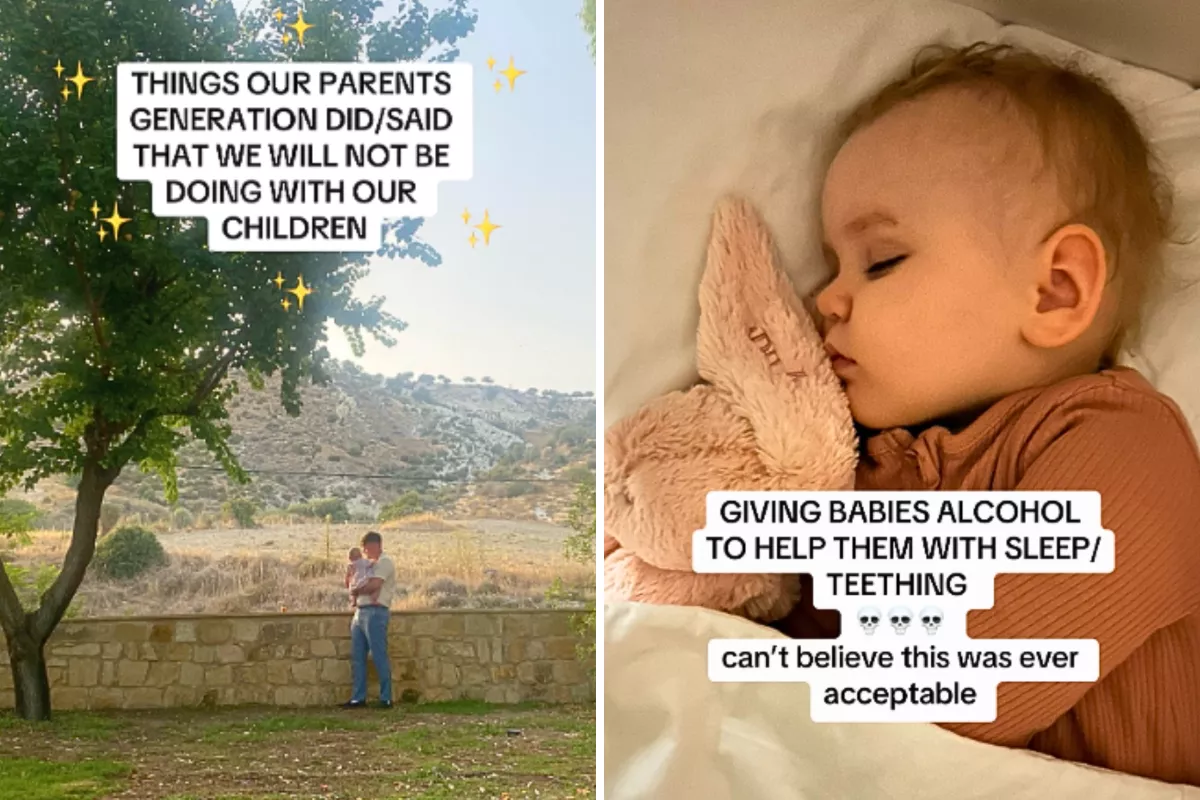As time goes by, opinions around how to best raise children change—and one Gen Z mom is sure of the parenting techniques of yesteryear that she will never use.
Jasmine Jones, 23, has sparked discussion online after voicing her parenting dos and don’ts in a TikTok post on June 15. In the video, she critiqued a number of parenting trends originating from the Baby Boomer, Gen X and Silent Generation eras that predate the birth of her toddler, Ava.
Read more: Best Savings Accounts for Kids and Teens
Jones, who shares parenting and pregnancy content under the handle @jasjxnes to her 2,000-plus followers, had titled her post: “things our parents’ generation said or did that we will not be doing with our children.” The video had been pieced together after looking back at the way the couple’s parents and their demographic cohort raised them, their friends and others that they knew. The clip, which shunned things from arguing in front of children to letting them “cry it out,” has garnered over 146,000 views and has attracted both support and criticism from viewers online.
“I think a lot of the issues I’ve talked about in the video have become so normalized in society that they’re often seen as the ‘easy route,’ and we’re determined to break that cycle with our daughter,” Jones told Newsweek. “I’ve received a lot of backlash because people feel called out on their actions, some of which are neglect and abuse toward their children.
From left: Jasmine Jones and her family pose at a pumpkin patch; and Jones as she sits with her daughter. The 23-year-old mom wants to raise her daughter, Ava, in an emotional environment that differs…
More
@jasjxnes
“I think survivor’s bias is a very real thing that comes into play here. Just because you or your parents did those things and were fine, that doesn’t necessarily mean that they’re the best, or most effective, way to do things.”
Read more: What Is a Checking Account and How Do They Work?
Jones, who is based in the U.K., said that being a young mother comes with challenges, one of which is that people “constantly” undermine or underestimate her. The Brit added that the impassioned responses her video prompted led to more people virtually projecting this negative stereotype onto her—but she has developed a thick skin.
“It’s something that I’ve just learned to deal with, but myself and my partner are both incredibly determined to stick by these choices,” she said. “With that being said, I really do understand that these things are often hard to achieve dependent upon your circumstances, and I’m completely sympathetic to the fact that parenting is hard.
Read more: Best Checking Accounts for Teens
“Children need guidance into the world, and that’s our duty as parents. We’re just choosing to do that using a more gentle, nurturing environment.”
Jones listed several outdated parenting practices for her viewers to see, all of which she vows to avoid. The practices, which were presented on slides in front of photos of Ava, include spanking, sending children to bed without dinner, and disregarding children’s feelings.
She also opposes arguing in front of children, using the phrase “there are starving children in Africa” to coerce children into eating, giving babies alcohol to help them sleep, letting children “cry it out,” leaving them without adult supervision, and leaving them home alone at a young age.
“I honestly didn’t expect the video to gain so much attention, and I definitely didn’t realize that it would be such a controversial topic,” Jones said. “I’m so grateful for the words of encouragement from other parents, who have praised us for the ways that we’re raising our child, and I hope that it has had an effect on others who might not have realized the harm that these actions could potentially cause.
Jones’ stance on modern parenting aligns with a broader trend among new parents, who generally adopt a more empathetic and technology-savvy approach compared to previous generations.
Millennial and Gen Z parents tend to seek out advice online rather than from relatives, and aim to prioritize a work-life balance and open communication with their children.
Jones noted that the reaction to her video was divided, as some viewers expressed shock that such practices still exist, while others defended them as essential for raising independent children.
“Let’s see how the next few years go before you lecture anyone,” one user, @wazzamcq, said.
Another, @rwz382, added: “Some of these you’ll look back on in years to come and laugh at.”
“I agree, I don’t even leave her in the car for the half minute it takes to go in to pay for fuel at the station,” a third user shared.
Another added: “Lost me at slide 10. I went alone to school at 5-years-old. Raise independent children, not scared little ones!”
“There is no way in the world you’ll never argue in front of the kids, just be prepared to talk to them about it afterward and explain that parents sometimes disagree on things,” @rc76000 said.
Jones believes the divide is largely generational, with older viewers feeling criticized by her comments.
“I think that older viewers are likely feeling attacked by the video, which was not at all my intention,” she said. “But it’s also important to talk about these things so that the cycle can be broken, and new parents can be taught on these issues so that they can make an informed decision on the type of parent that they want to be.”
Millennial and Gen Z parenting styles, often termed as “gentle parenting,” emphasize empathy, respect, and boundaries, focusing on guiding children rather than punishing them. A survey by Lurie Children’s Hospital, discovered that nearly three-quarters of millennial parents practice gentler parenting methods, which includes setting limits and using non-punitive discipline systems.
This approach is seen as fostering a healthier emotional environment for children, although it is sometimes misunderstood as permissiveness.
Despite the backlash online, Jones remains committed to her parenting choices. But she did find that viewers were keen to agree with her on one point; that the use of guilt to make children eat is futile and can do more harm than good.

Pictures from Jasmine Jones’ viral TikTok post that details her parenting dos and don’ts. The young mom received divisive opinions online after sharing her personal approach to raising Ava.
@jasjxnes
“One of the main things that has been mentioned in the comments is that we won’t be saying ‘there are starving kids in Africa’ as a way to encourage my daughter to eat,” she said. “Using African children as a way to manipulate your children into eating sets internalized racism very early on.
“It is such a stereotypical, racially undermined comment,” she added. “Not all children in Africa are starving, and in fact it’s actually a very financially diverse continent.”
The mom, stunned by the reach of her post, now hopes that her message will inspire other parents to reconsider outmoded parenting practices and adopt more compassionate methods.
“If I could influence even one parent to just be kinder to their kids, take their feelings and emotions into consideration sometimes, or generally just go easier on them, it would be a win in my eyes,” she said. “Kids make mistakes, and that’s fine. It’s all a learning curve.”
If you have a family dilemma, let us know via life@newsweek.com. We can ask experts for advice, and your story could be featured on Newsweek.
Uncommon Knowledge
Newsweek is committed to challenging conventional wisdom and finding connections in the search for common ground.
Newsweek is committed to challenging conventional wisdom and finding connections in the search for common ground.





